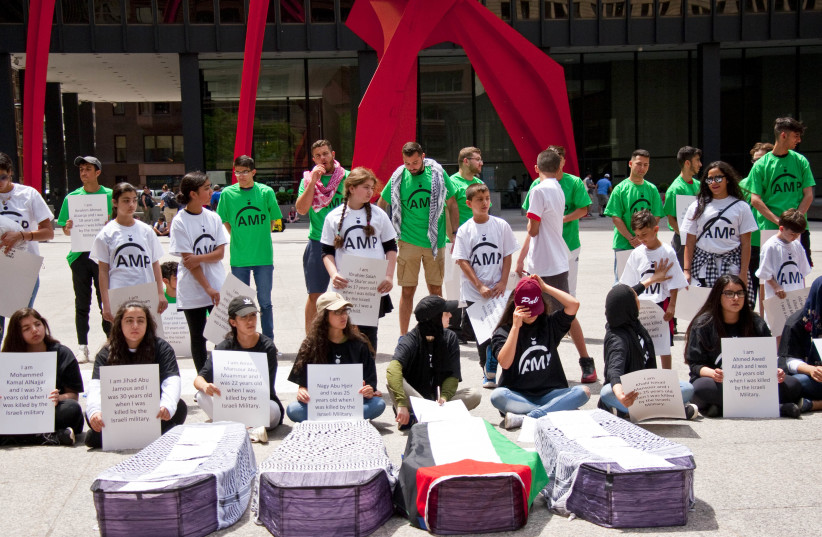Last year, I sank an anti-Israel BDS campaign at Princeton. Today, I’m calling attention to our inept Jewish leadership in the face of soaring Jew-hatred.
Hardly a day passes by when I am not inundated with harrowing tales of antisemitism rearing its ugly head on the university quad. American-Jewish students today are routinely pressured to conceal their Jewish identities, disavow Jewish student organizations, and support the anti-Israel Boycott, Divestment, and Sanctions (BDS) movement in order to gain entry into progressive campus circles.
Reams of data compiled within the past four years indicate the academy’s increasingly sharp turn against Jewish students, amplified by an administrative Diversity, Equity, and Inclusion (DEI) complex that traffics in post-colonial ideology and anti-white racism.
What sets this incarnation of university-based antisemitism apart from its modern predecessors, though, is that no single Jewish institution has been spared from its grasp. Campus Hillels (Jewish campus organizations) in particular, despite their pluralistic bent, are often on the receiving end of these pressures.
As the chief architect of Princeton’s anti-BDS effort in the spring of 2022, I witnessed this firsthand: a protest in front of my school’s Hillel against an Israel summer activities fair snowballed into a highly sensationalized BDS campaign that was ultimately defeated through laborious efforts.

But just as these institutions have been inoculated into the Israel debate by our opponents, they have sadly shown a significant ineptitude at defending their own members from these hostilities.
I once again speak from personal experience. At the height of the BDS campaign last spring, my Hillel placed its full weight behind me as I navigated the challenges of defeating BDS amid an antagonistic student body, cowardly university administration, and apathetic Jewish community.
Then, upon my return to school the following semester, the Hillel refused to entertain any of my suggested reforms to re-energize Jewish and pro-Israel students. Instead, it doubled down on inflating purposeless bureaucracies and gave me no choice but to step down from the numerous Hillel leadership positions and board memberships I had held for years.
Ultimately, my frustration drove me away from the Hillel community altogether, but I cannot help but continue to feel an immense degree of concern for those Jewish students who remain involved and have been overlooked by stagnant Hillel leadership.
Overwhelmed by a medley of pressures, numerous other Hillels across the country have also lost their way. A friend of mine who attends Washington University in St. Louis is so disillusioned by the myopia of his school’s Hillel that he no longer participates in Jewish life on campus.
Another, formerly based at a small liberal arts college in Maryland, was “canceled” by most of his classmates for attending a Birthright trip to Israel and opted to drop out of school after his Hillel was unresponsive.
Deterioration in American Jewish response to Jew-hatred
WHILE THESE behaviors are not reflective of every Hillel nationwide, they represent a disturbing deterioration in the American-Jewish community’s response to Jew-hatred, given that the epicenter of the phenomenon now sits squarely – and, for many American Jews, inconveniently – on the political Left. That American universities’ hubs of Jewish student life are unwilling to undertake forceful steps to confront this skyrocketing trend ought to be worrying to all of us.
Fortunately, some on the periphery of this crisis have chosen to act and have made significant inroads into the public discourse through their grassroots activism. Veteran community leaders Charles Jacobs and Avi Goldwasser recently founded the Jewish Leadership Project with the aim of holding derelict Jewish leaders accountable for their inaction.
I, too, have sought to do my part by conceiving my substack “Kavod” in late 2022 as a means to inform, educate, and innovate new strategies to defend our beloved Jewish community against this mounting catastrophe.
However, for those positioned in the eye of the storm – our Jewish community leaders at American college campuses – some serious soul-searching is in order if this cataclysm is to be curtailed.
Effective philosemitic advocacy in the ivory tower will take the form of something substantively different than the types of “activism” many university Hillels showcase today, such as weekly convening of rudderless advisory committees, administration-approved “antisemitism workshops” and “listening sessions” featuring anti-Israel participants, and highly-lawyered, equivocal statements in response to anti-Israel campus activity.
Instead, it will require honest, accountable relationships between Hillel staff and university administrators that are rooted in the former’s willingness to prioritize the concerns of Jewish students over personal ties; decisive top-down leadership in the face of rising campus hostilities; and an ironclad commitment from Hillel leaders to place their own reputations on the line in defense of Israel and the Jewish people.
No amount of window dressing, whether in the form of bureaucratic expansion or ritualistic practices, will yield nearly the same positive outcome.
Campus Hillels: the American-Jewish community charges you with the mighty responsibility of shaping our next generation of leaders and visionaries. You can still change course if you so choose, but time is running out. Now is the time to act.
The writer is a student at Princeton University and former president of Tigers for Israel. He can be reached at jaredstone@princeton.edu.
